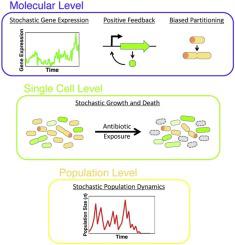Current Opinion in Microbiology ( IF 5.9 ) Pub Date : 2021-07-27 , DOI: 10.1016/j.mib.2021.07.002 Tatsuya Akiyama 1 , Minsu Kim 2

|
The effectiveness of antibiotics against bacterial infections has been declining due to the emergence of resistance. Precisely understanding the response of bacteria to antibiotics is critical to maximizing antibiotic-induced bacterial eradication while minimizing the emergence of antibiotic resistance. Cell-to-cell heterogeneity in antibiotic susceptibility is observed across various bacterial species for a wide range of antibiotics. Heterogeneity in antibiotic susceptibility is not always due to the genetic differences. Rather, it can be caused by non-genetic mechanisms such as stochastic gene expression and biased partitioning upon cell division. Heterogeneous susceptibility leads to the stochastic growth and death of individual cells and stochastic fluctuations in population size. These fluctuations have important implications for the eradication of bacterial populations and the emergence of genotypic resistance.
中文翻译:

细菌细胞对抗生素的随机反应:其机制和对种群和进化动力学的影响
由于耐药性的出现,抗生素对细菌感染的有效性一直在下降。准确了解细菌对抗生素的反应对于最大限度地消除抗生素诱导的细菌,同时最大限度地减少抗生素耐药性的出现至关重要。对于多种抗生素,在各种细菌物种中观察到抗生素敏感性的细胞间异质性。抗生素敏感性的异质性并不总是由于遗传差异。相反,它可能是由非遗传机制引起的,例如随机基因表达和细胞分裂时的偏向分区。异质易感性导致单个细胞的随机生长和死亡以及种群大小的随机波动。











































 京公网安备 11010802027423号
京公网安备 11010802027423号